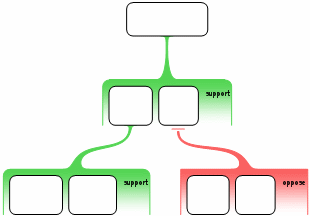
 |
|
|
|
|
| 5.3 Complex Arguments | |
To understand how to represent inference objections in argument maps, we need to keep in mind a fundamental principle. Every argument, no matter how complicated, is built up by combining simple arguments; and so in a fully-articulated argument map, every reason or objection must be aimed at some specific claim.
 |
In this case a single complex argument is made up of three simple arguments. Notice how the contention of one simple argument is (almost) always a premise of another. The only exception to this rule is the very topmost simple argument; its contention is not a premise of any other simple argument, and is called the main contention. |
| Discussion |
Inference objections seem to violate this rule, for an inference objection is, by definition, not aimed at any specific premise.
However, as we will see next, this is only because the argument is incomplete. An inference objection is not aimed at any of the currently stated premises. It is aimed at a premise - just one that has not yet been stated.
| Glossary | Contents | |
|
Copyright © Austhink 2003-2006 |
|
Last updated 28-Nov-2006